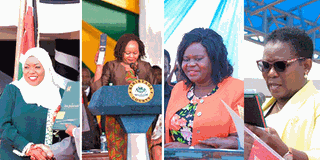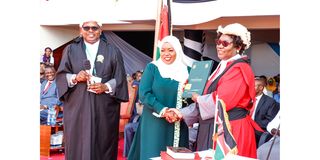The Governor: And now a toast to ‘Her Excellency’

From left: Governors Fatuma Achani (Kwale), Anne Waiguru (Kirinyaga), Gladys Wanga (Homa Bay) and Kawira Mwangaza (Meru).
What you need to know:
- Fatuma Achani is the first woman governor for Kwale County.
- Susan Kihika’s political journey proves that determination and focus can indeed bear fruit.
- Ms Mbarire's rise to the governor’s position is an encouragement to young women politicians.
- Gladys Wanga is the Homa Bay's and Nyanza region's woman governor.
A standing ovation for voters in Kenya’s seven counties who elected women governors. They have proved that, indeed, leadership is not a man’s premise. They become model counties for benchmarking for the other 40. And to the women whom the people vested the power to lead, hats off. In this article, we highlight the leadership journey of these women.
Fatuma Achani

Kwale Governor Fatuma Achani (centre) is sworn into office at Kwale Stadium on August 25, 2022.
Ms Achani is the first woman governor for Kwale County, elected on a UDA ticket. She has served as a two-term deputy governor for her predecessor, Governor Salim Mvurya.
The duo has enjoyed an amiable working relationship that Mr Mvurya endorsed her bid.
Last June, Mr Mvurya singled out improvements in the education sector as the greatest achievement of his administration.
Through Elimu Ni Sasa Initiative, they sponsored needy students to complete their primary, secondary, college and university education.
He said they had built 514 modern ECDE centres and employed 926 teachers. They also started mentorship programmes to empower youth.
With her election, Ms Achani now has the power to carry on their legacy. She won with 59,674 votes against ODM’s Prof Hamadi Boga who garnered 53,972 votes. Ms Achani has a law degree from Moi University and a diploma from the Kenya School of Law.
Prior to politics in 2013, she worked as an associate advocate at a Mombasa-based law firm. She also served as legal counsel and programme officer at the Federation of Women Lawyers.
Susan Kihika

Nakuru Governor Susan Kihika is sworn into office at Nakuru ASK showground on August 25, 2022.
Ms Kihika’s political journey proves that determination and focus can indeed bear fruit. In 2013, she was elected the first Speaker of the County Assembly of Nakuru. During her tenure, she protested the then Governor Kinuthia Mbugua’s plain disregard of the house’s decision. In fact, it was the first county assembly in Kenya to threaten to impeach a governor.
In 2015, she made public her intentions to run for the Nakuru senatorial seat.
She won the 2017 election on a Jubilee Party ticket becoming the first woman senator in Nakuru County.
In Senate, she sponsored the controversial Reproductive Healthcare Bill, which was rejected by pro-life activists on grounds that it sought to legalise abortion.
The bill, however, did not advocate for universal abortion but only provided for circumstantial abortion as stipulated in the Constitution.
Ms Kihika is a trained lawyer who returned to Kenya in 2012 from the US where she practised law.
She has a degree in political science and government from the University of North Texas in Denton. She is also a doctor of law graduate from Southern Methodist University in Dallas, Texas. She founded the Kihika Law Firm in Dallas, and once served as a chief prosecutor in the USA.
She won Nakuru governor’s seat on a UDA ticket with 440,707 votes against her closest competitor, incumbent governor Lee Kinyanjui who garnered 225,623 votes.
With her win, she made history again, as the first woman governor of Nakuru County.
Cecily Mbarire

Embu Governor Cecily Mbarire (left) with her deputy display their certificates at the University of Embu on August 25 after they were sworn in.
Ms Mbarire is Embu governor. Her rise to the governor’s position is an encouragement to young women politicians.
She has been in politics for nearly two decades, 15 years of which she served in the National Assembly as a nominated and elected MP.
In 2003, National Rainbow Coalition nominated her to Parliament. Then in 2007, she successfully contested for Runyenjes parliamentary seat on Party of National Unity.
Between 2005 and 2007, she was the Assistant Minister in the Ministry of Transport.
She retained the seat in the subsequent 2013 election, competing on The National Alliance party. Her tenure came with the election to the Kenya Women Parliamentary Association as a chairperson, a position she served until 2017.
Her first gubernatorial attempt in 2017 failed to sail through as she lost to Martin Wambora in the Jubilee party primaries.
The party, however, nominated her to represent special interest groups.
This year, UDA gave her a direct ticket to run for the seat. She garnered 108,610 votes to defeat Lenny Kivuti of Devolution Empowerment Party who got 105,246 votes.
She is an economics and sociology graduate from Egerton University. She also has a Global Executive Master of Business Administration from United States International University.
Gladys Wanga

Homa Bay Governor Gladys Wanga with her husband George Wanga (left) during her swearing-in.
Ms Wanga is the Homa Bay governor and the first woman for that matter. Until her recent win, she was the county’s Woman Representative.
Her bid was even endorsed by Kochia clan elders in what they said was a move to end male chauvinism in the community.
Her new position adds to her list of firsts. In the 12th Parliament she served as the first woman chairperson of the Parliamentary Committee on Finance and National Planning Committee.
In 2020, an Infotrak opinion poll on the performance of women legislators ranked her second best after Rosa Buyu, outgoing Kisumu Woman Rep and now Kisumu West MP-elect.
She was declared the winner having polled 244,559 votes against her closest competitor Evans Kidero who got 154,182 votes. She vied on Orange Democratic Movement (ODM) ticket while Mr Kidero was an independent candidate.
ODM had hoped to make history with the election of at least 15 women governors. That dream though, lives on through Ms Wanga.
She has a master’s degree in health management from Kenyatta University.
Anne Waiguru

Kirinyaga Governor Anne Waiguru takes the oath of office at Kamiigua Youth Polytechnic in Gichugu Constituency.
In 2017, Ms Waiguru together with late Dr Joyce Laboso and Charity Ngilu made history by being elected the first women governors under devolution.
While she headed Kirinyaga, Dr Laboso was in charge of Bomet, while Ms Ngilu led Kitui.
In the just-ended election, she defended her seat while Ms Ngilu opted out. Ms Waiguru retained her seat on a United Democratic Alliance (UDA) ticket.
While campaigning in 2017, the locals branded her minji minji, which in the urban dictionary means “a very, very cool girl.”
She accepted it and used it to her advantage to popularise herself among the voters.
This time round, her race for the county office can only be equated to a marathon between two champions. She faced off with a fellow woman Wangui Ngirici, who ran on an independent ticket.
Local pollsters predicted a tight race between the two as opinions showed Ms Ngirici running strongly behind Ms Waiguru.
She defeated Ms Ngirici by 7,411 votes. A total of 113,088 voters chose her against 105,677 who voted for Ms Ngirici.
Ms Waiguru joined politics in 2016 after resigning from her position as a Cabinet Secretary for Ministry of Devolution and Planning.
Between 2017 and 2019, she was the vice chairperson of the Council of Governors, an umbrella body of all the 47 county governors in Kenya.
A 2020 Kirinyaga County Community Score Card jointly done by the Council of Governors and Ford Foundation, indicated steady development in the county.
It reported the emergence of new projects including roads, new markets and refurbishing of social amenities.
On the county’s website, Ms Waiguru’s government is reported to have established 18 new Early Childhood Development and Education (ECDE) classrooms and renovated 59 others.
She has also distributed 86,000 improved kienyeji chicks to 77 farmer groups. She hopes to finish what she started in her second term.
Ms Waiguru is a public policy expert and has a master’s degree in Economic Policy from the University of Nairobi.
Wavinya Ndeti

Machakos Governor Wavinya Ndeti is sworn into office at the Kenyatta Stadium, Machakos town.
She is the Machakos governor-elect having won on a Wiper Party ticket, becoming the first woman to hold the position in the county.
She resigned last February from her position as Transport and Infrastructure Chief Administrative Secretary to vie for the seat.
She garnered 226,609 votes against Chama cha Uzalendo’s (CCU) competitor Nzioka Waita who got 129,181 votes.
Her bid got a boost when outgoing governor Alfred Mutua of Maendeleo Chap endorsed her.
But she’s not knew to politics. In 2013, she unsuccessfully contested for the governor’s seat on a CCU ticket. Before then, she served as Kathiani MP (2008-2013).
During that time, she was also appointed Assistant Minister for Youth and Sports.
Ms Ndeti is a computer scientist with an undergraduate degree in computer science from South Bank University, England.
She also obtained a master’s degree in business analysis and design from City University, United Kingdom.
Kawira Mwangaza

Meru Governor Kawira Mwangaza takes the oath of office in a ceremony presided over by Justice Lucy Njuguna in Meru on August 25.
Ms Mwangaza’s win can be described as a Daniel that fell Goliath.
By use of the power of her independent candidature, she conquered men from established political parties.
First, it was the incumbent Meru Senator Mithika Linturi of UDA. She had 209,148 votes against his 183,859 votes.
The second man is the reigning Governor Kiraitu Murungi of Devolution Empowerment Party, who came third with 110,814 votes.
Until her victory, Ms Mwangaza was the county’s woman representative and leveraged the National Government Affirmative Action Fund to prove her capability to lead.
She built houses for the poor, and donated dairy cows, school uniforms, desks, blankets, and gumboots. She also offered needy students scholarships.
Ms Mwangaza, also a bishop at Baite Family Fellowship, once worked as a house help to raise fees for her secondary school education. Luckily, her aunt later sponsored her studies.
In 2013, she unsuccessfully contested the Buuri parliamentary seat on Mwangaza Party. In an earlier interview with the Nation, she said the campaigns drained her financially.
“After the 2013 campaign where we spent Sh20 million, I was broke and heavily indebted. My husband and I relocated to Ruai where we sold onions and tomatoes as we tried to recover financially.”
In 2015, she launched Baite TV, a vernacular station that broadcasts in Kimeru. The station gave her the platform to reconnect with people and sell her agenda.
Ms Mwangaza has a degree in education (guidance and counselling) from Kampala International University in Uganda.

From left: Governors Wavinya Ndeti (Machakos), Susan Kihika (Nakuru) and Cecily Mbarire (Embu).
They year 2022 is a year of women. Against all odds, a record seven women made history after Kenyans entrusted them with top political leadership as governors in the counties of Homa Bay, Machakos, Kwale, Kirinyaga, Nakuru, Meru and Embu.





